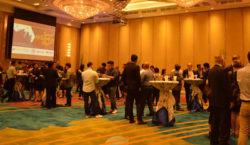Denmark and Sweden have re-opened their respective embassies, while the former business council has upgraded itself to become the Nordic Chamber of Commerce Philippines (NordCham) and can offer all essential consultancy and assistance in the country – all based on significant growth in the presence of Nordic businesses there. Now the platform is there for increased trade relations and investment between the Philippines and the Nordic countries. ScandAsia paints the picture with NordCham.
News from the Philippines outside the country tend to be negative, but as for the Nordic countries it is all good news from this island nation: two new embassies, a Nordic chamber that keeps on growing, and more Nordic companies entering the country.
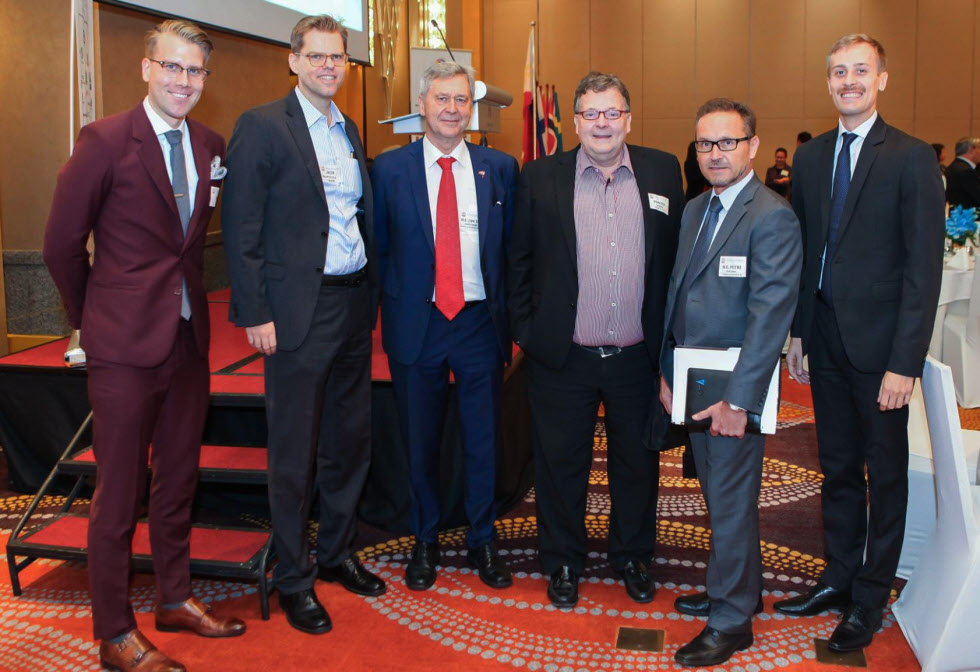
While the Philippines has an image problem, according to NordCham’s President Bo Lundqvist, he thinks that there are plenty of good news beyond the headlines.
“You probably have some sort of pre-set impression, typically shaped by what you read and what you see. But for a business you somewhat look a bit deeper, at some other aspects like financial capability, tax regulations, various incentives and what not,” thinks Bo who himself runs a retail business solutions company (see separate story).
“In NordCham we get a lot of questions around these headlines and all of that, but having said that it doesn’t seem that Philippines is off the charts. We still get a lot queries and interest and still do a lot of consulting work – all focusing on companies eventually investing here. So–believe it or not–from a business perspective I do not think that it’s a dead end. I think there is still serious interest from a strong Nordic interest in doing business with Philippines in one way or the other; be it export to, manufacturing, or outsourcing service from the Philippines.”
“I am happy to see that some businesses take a deeper perspective in doing business in the Philippines. And once they get here, and quite a lot of them come, they are usually positively surprised of what they see and realise that things are different than how they are portrayed in the evening newspaper back home.”
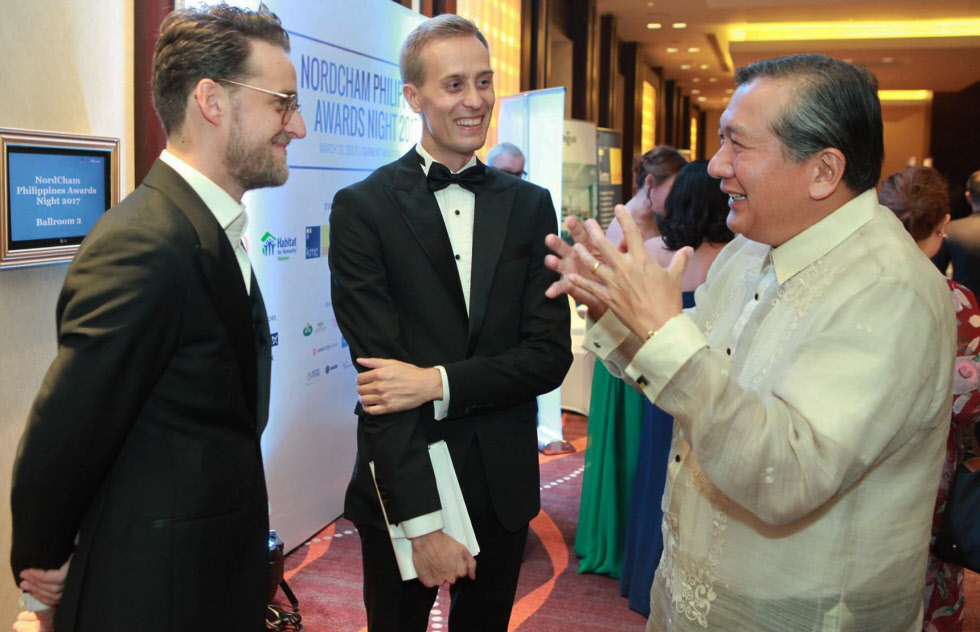
But Bo also says the continued negative news is a concern: “While we have an extensive line of consulting assignments that NordCham is doing specifically in identifying business opportunities, I still think there is a bit of wait-and-see when it comes to actually taking the steps to come here. And that is a little dangerous, as it may turn into a decision to go elsewhere.”
“Having said that, we are not very good at creating good news here. There is a lot of positive development in the Philippines; far more positive than negative in my opinion. But we have a bit of an issue with creating positive news that hits the headlines abroad and creates a positive image of the country.”
Bo thinks there is something to learn from Thailand that always get positive things written as well, no matter what happens in the country.
For the chamber itself, the very positive development can be told in numbers: from 18 founding members to 120 after five years. The Nordic Business Council Philippines changed its name in September 2016 to NordCham Philippines, as a reflection of this growth.
“We are no longer a new young kid on the block but an establish player in the chamber of commerce scene here,” states the Executive Director Joona Selin. “After reaching 100 members we said that we had built a foundation that warranted us to call ourselves a chamber. We had been very modest in the beginning to get things organised and therefore took the name of a Business Council at first.”
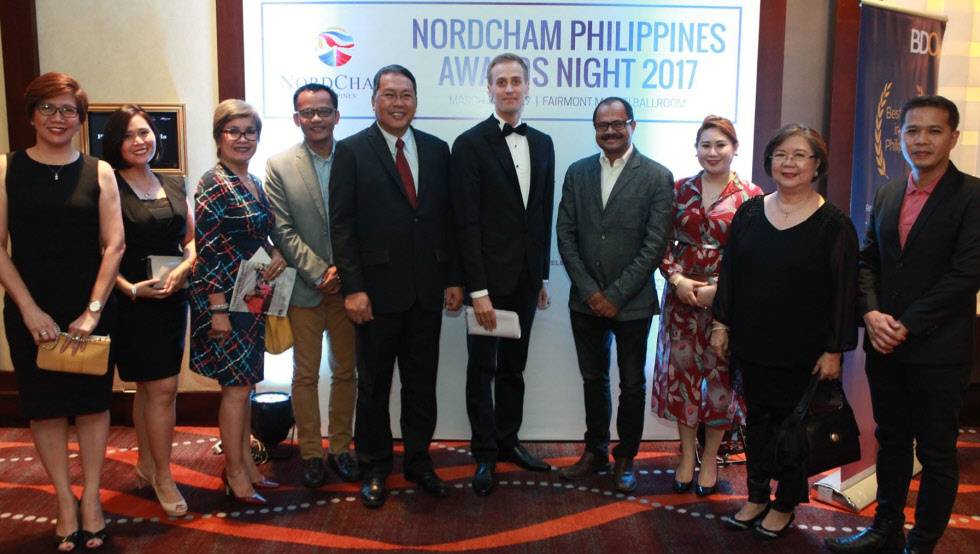
The strong increase in members and more full time staff (currently five and hiring) were key indicators to raise the profile and rebrand.
“We have built a solid foundation and we are up there among our peers in terms of activities and also in terms of size.”
In launching NordCham they also introduced an advisory board, which includes the four Nordic ambassadors and the honorary consul generals, in addition to private sector representatives with connections to the Nordics.
“This is a reflection of how we position ourselves in-between the private and the public sector, between the Nordics and the Philippines. And all our levels of key stakeholders; employees, operational team, board of directors and advisory board reflect the fact that we operate in the Philippines as a mediator between the key stakeholders in the Nordic-Philippine business community,” adds Joona.
“The members mostly consist in subsidiaries of Nordic multinational companies, but we also have other multinationals and also Philippine corporations. What is noteworthy is that for a number of subsidiaries there are local country heads.”
NordCham also stands out in the way it is operated, regarding both its commercial structure and with wide outreach.

“Yes, we are very serious about this,” confirms Bo Lundqvist. “The chamber is run as a business; we’re not a club. We divide our business into two segments, one being member services and the other consulting services so we divide pretty much all our actions around those two. Membership services could be business member services, seminars with the government and private sector, partnerships we enter into etc. We also have a cultural angle, where we somewhat try to pull together the Nordic community more from a family and culture kind of perspective.”
Some other highlights, among their “staple events”, are the annual Ambassador’s Luncheon and the NordCham Awards night.
“With the awards where we recognise member companies excelling in areas that we feel strongly about: Corporate Social Responsibility, growth, being an outstanding employer, and the importance of Small and Medium-sized enterprises. At the same time we promote the fact that these companies are present here but also the facts about what the Nordic values are and what the business community her in the Philippines looks like,” explains Joona.
“The mix of corporate events and more social events also act as the avenue of bringing the Nordic-Philippines business community together. In addition to that we have monthly events where we give updates for instance on latest legislations; most recently on topics such as the new data privacy law, and tax reform. The fact we have been able to establish this continuity in our operation is also a reflection of the growth and what prompted the changes in the organisation to call ourselves a chamber of commerce.”
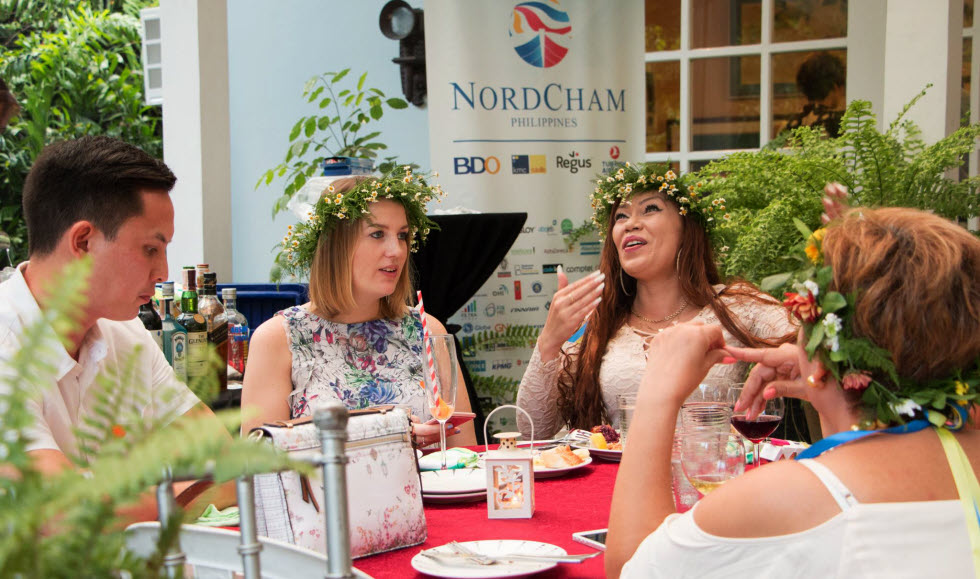
Reflecting its positioning NordCham cooperates with and supports the Nordic diplomatic missions. Joona says that it is the business sector that has been driving the presence, which then led to also the governments strengthening their presence.
“Major companies and also new investment both from Denmark and Sweden have poured into the country. The immediate impact for both these countries having re-opened embassies is that the Philippines shows on the radar screen back home. So, we see an increased number of company delegations coming in, led by the missions. There’s increased traffic and as a result of that more companies doing business.”
“Locally, there is of course tremendous interest in the business community but also in the media that the embassies have returned. They have been in the limelight here locally, so it really works as a two-way street to promote the business relations but also tourism and cultural exchange for instance, so it is definitely seen as a massive boost to the Nordic business community to have the embassies back on the ground. And we can only cross our fingers that the Finns will follow suit very soon,” Joona hopes.
Denmark’s ambassador has a key role to promote trade and the embassy has senior commercial officers, while the Swedish embassy has a commercial counsellor. Sweden has recently also strengthened with a Country Manager for Business Sweden: “Now they have presence on the ground which is another boost to bring in more, in this case, traffic from Sweden in terms of companies looking into and coming to the market. To handle a country the size of the Philippines you need local presence for sure!”
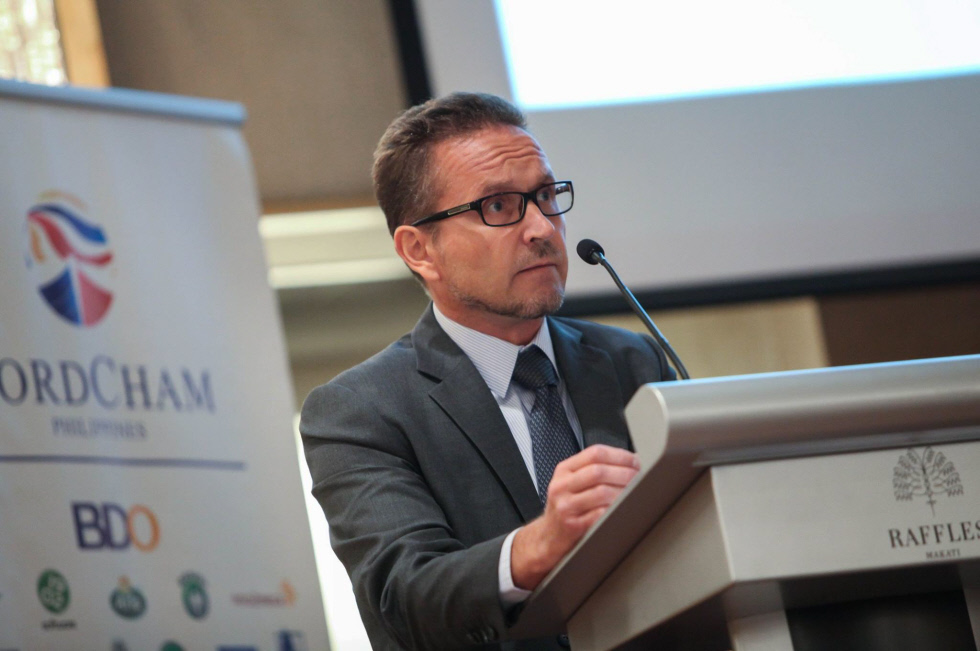
“At NordCham we certainly support the strengthened local presence of governmental and semi-governmental business support organisations here.”
“And we have a set of very engaged and very good ambassadors that all of them do a great job in terms of selling and marketing our countries. And from that perspective NordCham is also very engaged in that process to sort of position the Nordic countries for the qualities we stand for,” says its President.
Overall, the chamber has noticed an increased level of interest from the Nordics. “Mainly companies are looking at the Philippines from the local market perspective – to sell their products. Second, is to set up service centres, be it in IT, software development, or other services such as finance/accounting or HR. Third, in the pecking order, I would add manufacturing; Nordic companies have set up factories to cater to the domestic market as well as to export to markets in Asia and globally,” says Joona.
In November NordCham Philippines organised the EU Pavilion at Medical Philippines Expo in Manila for European companies exploring business opportunities in the growing healthcare sector.
“And Jotun (the Norwegian paint company) inaugurated their factory to cater to the Philippine market. That represents FDI and also tapping into the local market here; so it’s a great example. And looking broadly concerning trends in the past few years, for instance H&M have been more aggressive with their growth in the Philippine market than initially planned.”
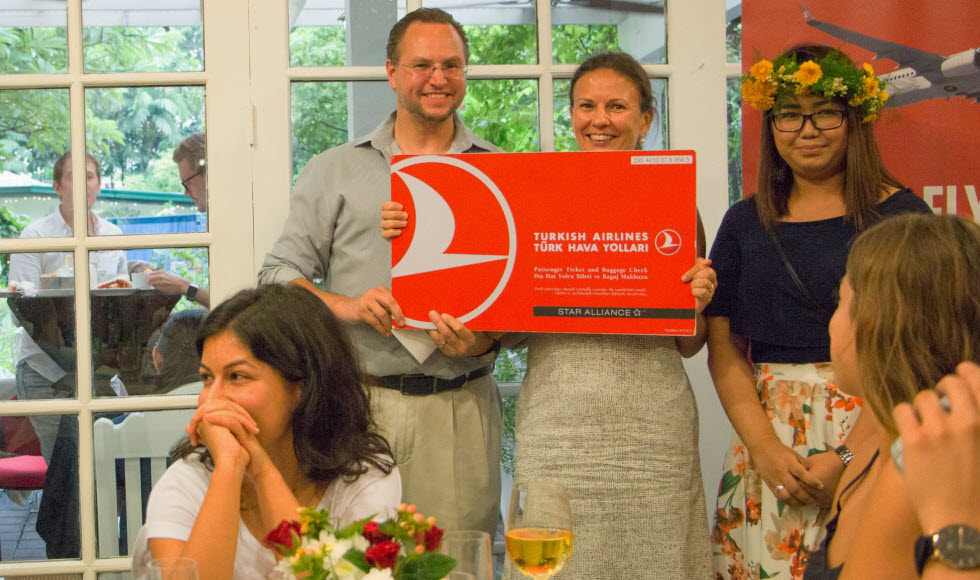
When it comes to the specifics of the business services Joona explains that NordCham offers a range of those: from market entry, business development, local representation to government relations services.
Partner and distributor search is done in-house: “We have a wide network locally, across a number of industries and different companies. We are confident, and have proven, that we can pretty much identify the key clientele, e.g. who is the target customers and decision makers, and set up meetings with them. We typically provide this for companies who are either in their very early stage of market presence or have no market presence in the Philippines yet but are convinced that a market exists.”
Often, as Joona explains, Nordic companies not yet on the market often look for a distributor and have a profile of what that one should be like. NordCham then try to match it with local companies and come up with a short-list. If being part of the assignment, NordCham will then interview these companies to verify if they are suitable local partners – after which these will be assessed with the clients.
“Local representation is for companies who have closed a deal but does not yet have a local entity. So we act on their behalf to ensure that paperwork gets done and act as facilitator between client and supplier.”
NordCham has also built–and keeps on building–a network of so called multipliers, which are fellow chambers of commerce, business organisations, private consultancies and government organisations.
“This works both ways; sometimes we have an inquiry about a market we cannot cover, so we can give that to our partner organisations or collaborators – that is the sort of win-win we are looking at. And at the same time in Nordic countries we have similar private consultants who would then provide us the inquiries and leads about Philippines market. That is sort of the model on which we work.”
“When there is interest from a business we will work in tandem to make sure that this client also gets to understand the Philippine opportunity or gets to do what they have planned.”
Nordcham also makes an annual road show to the Nordics together with the country’s Department of Industry, and in partnership with the business world organisations of the Nordic countries.
The next step, discloses Bo Lundqvist, is to establish a local foothold there, “at least one person that will represent us on the ground in the countries so we can be a bit more efficient in working with local businesses that have interest in dealing with the Philippines. So part of our core interests and missions is really to enable businesses from the Philippines to deal with the Nordic countries and vice versa; that’s very important to us.”


